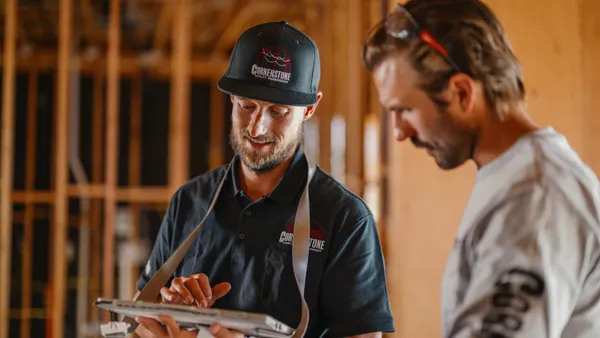Dive Brief:
- Digital twin provider Willow has announced a partnership with Hollywood Park to create a digital twin of a 300-acre sports and entertainment development, including SoFi Stadium in Los Angeles.
- The new home of the Los Angeles Rams and Los Angeles Chargers will be the first major stadium to utilize digital twin technology in the U.S., according to the announcement.
- Capturing data in and around the stadium, Willow will create a virtual copy of the area that will be used to provide analytics and insight into the experience of attending a game there. This data will help SoFi Stadium and Hollywood Park facilities managers to identify potential problems, optimize sustainability and manage risk, the statement said.
Dive Insight:
SoFi Stadium crossed the goal line in time for the 2020 NFL season, despite 49 workers testing positive for COVID-19 at the jobsite this summer. The stadium has already hosted a number of NFL games, and, as with many new professional sports stadiums, SoFi was designed with modernizing the fan experience in mind.
To compete with the comfort and safety of watching games from home, stadiums have tried to curate a larger spectacle, to include more boxes, nearby restaurants and entertainment areas. SoFi will host Super Bowl LVI in 2022, the College Football Championship Game in 2023 and the Opening and Closing Ceremonies of the 2028 Summer Olympics, as well as large events like concerts.
The use of digital twin technology will make it easier for facilities managers to enhance game days for patrons, said Jason Gannon, managing director of SoFi Stadium and Hollywood Park, in the announcement.
"Our goal is to deliver a new type of fan and visitor experience, and to do that, we need a comprehensive, data-driven view into how all the pieces of this project connect," he said.
A digital twin converts all quantifiable aspects of a physical building into an evolving virtual replica, allowing owners, facility managers and built environment professionals real-time insights to strategize and optimize every aspect of a building's operations.
While digital twin tools are only being used sporadically in the construction industry, many industry watchers predict they will soon become an invaluable method for contractors and engineers. Common applications include:
- Insight into a building’s efficiency performance in real time.
- Predicting potential failures in systems like HVAC, water and electrical.
- Providing a project team with access to as-built and as-designed models, which are constantly synced in real time.
- Providing insight to a client to support ongoing structural enhancements.













